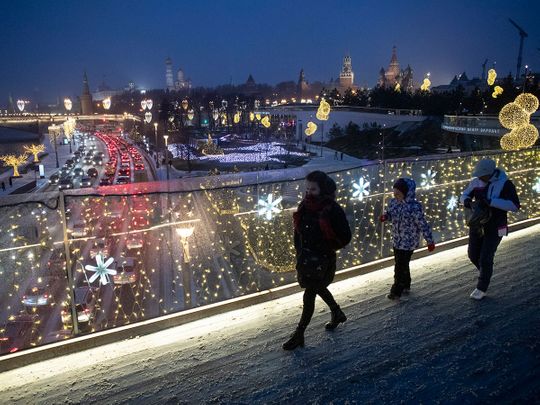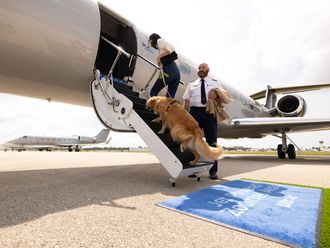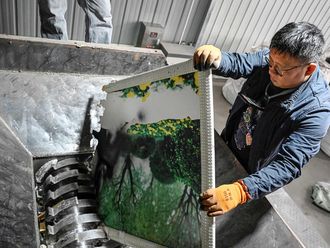
Moscow: The authorities in Moscow had spent millions on Christmas trees, sparkling lights and other holiday decorations, but the festive mood was still missing something: Winter weather.
As the warmest December on record drew to a close, little snow had fallen, so the city made artificial snow and trucked it to parts of the city center - and much of it quickly melted into slush. Images of trucks unloading snow spread fast on social media, as observers ridiculed the government for spending money on something that usually just falls from the sky.
"With the Moscow budget, you can buy anything, even winter," one user wrote on Twitter, pointing to the vast wealth disparity between the capital and the rest of Russia. "Let's install freezing machines along the Tverskaya," another one wrote, referring to the city's main thoroughfare, where the authorities said the snow would be used to build a hill for snowboarders.
Many Muscovites on the streets appeared to be less scornful. They said they had missed the snow and welcomed the decision to bring it before New Year's Eve, the main family holiday in Russia, when the country stops for a week to celebrate. At a time of year when temperatures usually stay well below freezing, Moscow has had some highs in the mid-40s Fahrenheit in the past two weeks.
As if to mock the artificial scene, a blizzard enveloped Moscow on Monday night, leaving a natural snow cover on city streets - but forecasts say that, too, will melt away before the New Year.
"Yes, they brought the snow, and of course when they did it, a snowfall began, too," said Larisa B. Artamonova, 70, a retired engineer. "It will all create a festive mood, I am sure."
Muscovites have a difficult relationship with snow. While many like it as a sign of the holidays, others complain that snowfall produces traffic jams, the salt spread on roads ruins shoes and the mixture turns into a dirty, gray muck.
Last week, Moscow City Hall blocked many central streets around the Kremlin for the holiday season, which will last into the next week. Apart from the snowboard hill on the Tverskaya, a stash of snow was also spotted on Red Square, surrounded by a fence - as if to keep people from stealing any - and another appeared in the new Zaradye Park nearby.
The artificial snow was produced by cutting ice at skating rinks around the city, the authorities said.
"The machines there cut ice, producing ice crumbs, so we brought it," a city official, Aleksei Nemeryuk told Govorit Moskva, a local radio station.
As the climate has heated up in recent years, Russia, like much of the world, has experienced record-breaking heat, with 2019 being the warmest year since observations began, according to meteorologists.
Many northern communities in Russia are built on permafrost that no longer merits the label, melting steadily and forcing people to relocate. Hunters and fishermen have had to change their routines as animals shift their migration routes.
The ice that polar bears traverse to hunt at sea has receded so far that the hungry animals are scavenging on land; in February, dozens of them roamed around a settlement in the Far North in search of food. There have been reports of brown bears, too warm to hibernate, out looking for meals, too.
Ski resorts in Sochi, a city on the Black Sea, said Sunday that they would limit the number of ski passes sold during the holiday season because the dearth of snow meant that only 20% of trails could be opened.
"Winters have turned much warmer over the past 30 years," said Yelena Morenko, 55, walking with her husband, Alexander, along Petrovka, one of Moscow's most elegant streets. "The season has shifted for at least one month."
Russia could also reap benefits from global warming. Gas and oil companies are expected to benefit from easier access to raw materials in the Arctic and eastern Siberia. Russia is building a fleet of icebreakers to take advantage of the warming northern sea route.
Keeping Muscovites in a festive mood has been among the top priorities of the city's ambitious mayor, Sergei S. Sobyanin, who presides over the country's richest and most contrarian city.
The government has invested heavily in improving the city's infrastructure and has held various festivals that at times keep Moscow's main squares and streets busy with something other than anti-Kremlin protests.
"I don't think there is much to see here, we came to Moscow to celebrate," said Angelina Amelina, 25, who came to the capital from St. Petersburg, Russia's second-largest city.
Walking with her boyfriend, Pavel, along the red walls of the Kremlin, Amelina said, "With or without snow, it is hard to create a Christmas-like atmosphere here; there are too many people and the people are so stressed."












